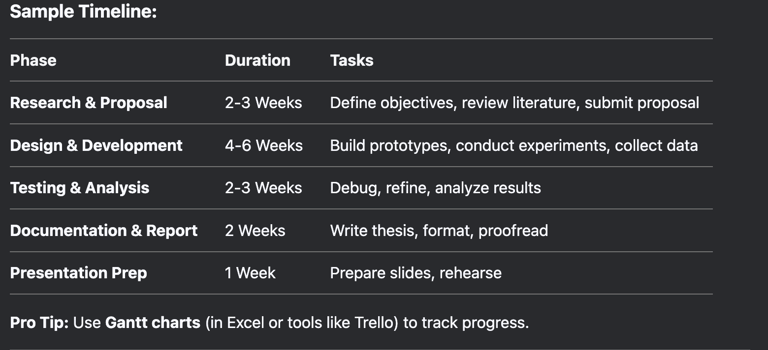How to Ace Your Final Year College Project: A Step-by-Step Guide
"Stuck on your final year project? 🎓 This ultimate guide covers topic selection, research, documentation, and presentation tips to help you deliver a standout project with confidence. Perfect for all disciplines! #FinalYearProject #CollegeSuccess"


Your final year project is one of the most crucial academic tasks you’ll undertake in college. It’s not just about grades—it’s an opportunity to showcase your skills, apply your knowledge, and even impress future employers.
But where do you start? How do you ensure your project stands out?
This guide will walk you through how to plan, execute, and present a successful final year project—with tips from topic selection to final submission.
1. Choose the Right Topic
Your project’s success begins with selecting a relevant, feasible, and interesting topic.
Tips for Topic Selection:
✅ Align with Your Interests – Pick something you’re passionate about.
✅ Check Feasibility – Ensure you have access to resources (data, tools, mentors).
✅ Research Gaps – Look for unexplored areas in your field.
✅ Consult Your Guide – Get approval early to avoid last-minute changes.
Example:
Computer Science: "AI-Based Fraud Detection in Banking"
Business: "Impact of Social Media Marketing on Small Businesses"
Engineering: "Design of a Solar-Powered Water Purifier"
2. Plan Your Project Timeline
A well-structured timeline keeps you on track.
3. Work Closely with Your Guide
Your project guide is your biggest asset—utilize their expertise!
How to Make the Most of Their Guidance:
📅 Schedule Regular Meetings – Weekly or bi-weekly updates.
📝 Ask Specific Questions – Don’t say "Is this okay?" Instead, ask:
"Should I use Python or MATLAB for data analysis?"
"How can I improve my survey methodology?"
📂 Share Drafts Early – Get feedback before finalizing.
Avoid:
❌ Waiting until the last minute to seek help.
❌ Ignoring feedback.
4. Research & Data Collection
For Theoretical Projects:
Use Google Scholar, IEEE Xplore, JSTOR for academic papers.
Cite properly (APA/MLA format).
For Practical/Technical Projects:
Collect real-world data (surveys, experiments, APIs).
Use tools like Excel, Python (Pandas), or SQL for analysis.
Pro Tip: Keep a research journal to log sources, ideas, and challenges.
5. Develop & Test Your Project
Software Projects? Follow Agile methodology (build-test-refine).
Hardware Projects? Document each prototype iteration.
Business Projects? Validate with case studies or surveys.
Common Pitfalls to Avoid:
⚠️ Overcomplicating – Start simple, then enhance.
⚠️ Ignoring Errors – Test rigorously before final submission.
6. Write a Strong Thesis/Report
A well-structured report is key to scoring high marks.
Structure:
Title Page
Abstract (Summary in 150-300 words)
Introduction (Problem statement, objectives)
Literature Review (Past research gaps)
Methodology (How you conducted the project)
Results & Analysis (Charts, graphs, findings)
Conclusion & Future Scope
References (Use citation tools like Zotero)
Pro Tip: Use Grammarly to avoid grammar mistakes.
7. Prepare a Stellar Presentation
Your final presentation can make or break your project’s impression.
Tips for an Engaging Presentation:
🎤 Practice Multiple Times – Time yourself (usually 10-15 mins).
📊 Use Visuals – Graphs, diagrams, and minimal text.
💡 Anticipate Questions – Be ready for queries from examiners.
Slide Structure Example:
Title Slide
Problem Statement
Objectives
Methodology
Key Findings
Conclusion & Future Work
8. Final Checklist Before Submission
✅ Proofread report (no spelling/grammar errors).
✅ Verify formatting (font, spacing, margins).
✅ Test project demo (if applicable).
✅ Submit before the deadline!


